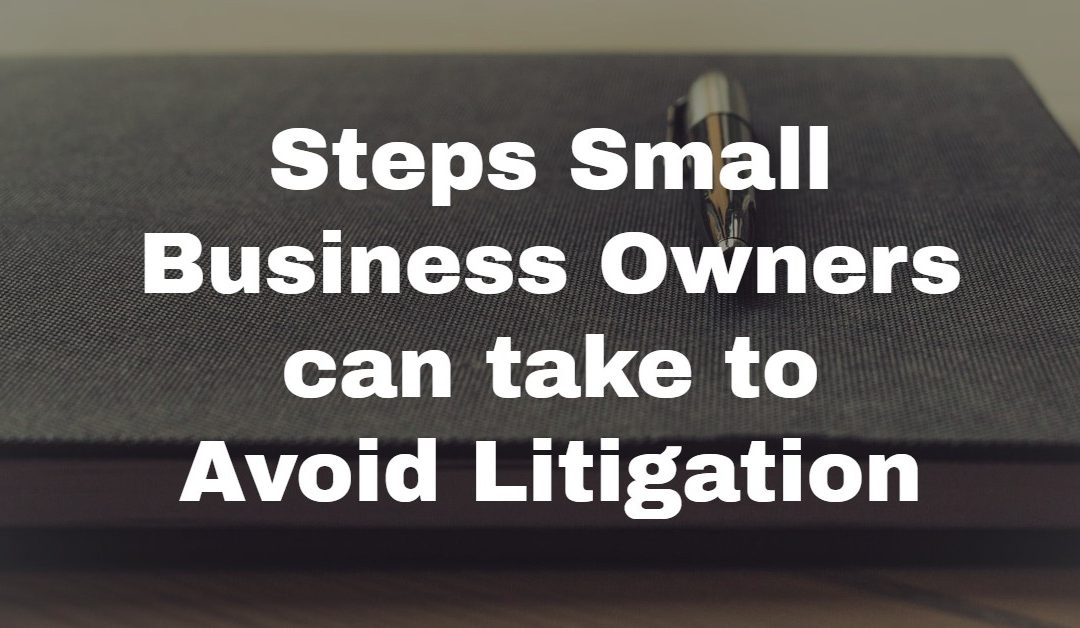No business owner likes to think they will have to face litigation issues.
For small business owners, litigation is often a costly, drawn-out legal battle that most owners cannot afford. Often times, one major lawsuit could be enough to cause some small business owners to shut their doors completely. To avoid the possibility of litigation, there are several steps small business owners can take.
Forming the Business
In today’s litigious atmosphere, the most common business-related lawsuits involve internal disputes between business owners. This is especially true when minority and majority ownership interests exist, usually in part due to faulty planning and communication during the formative stages of the business.
When mistakes made at an early stage are left unaddressed, they fester and end up putting the business at risk in the long-term. It is important for each party involved to understand what business ownership means, what is expected of each party, and what the overall vision for the business is.
Careful planning is essential during the formation stage of a business. Planning should involve an analysis of the proper business entity and structure as well as the creation of a shareholder or operating agreement.
A business attorney can help in the formation of a business by explaining the various ways to set everything up and recommending the best way based on the potential owners’ specific situations. The attorney can also assist with drafting documents specifically for the business.
This could ensure that all parties’ needs are met rather than potentially relying on a generic contract from the internet and could also ensure that all of the business’ bases are covered. Handling the formation of a business without an attorney as a guide could lead to documents being created incorrectly or not at all. Without these critical documents in place, the court’s only reasonable resolution may be to dismantle and divide the business.
Employees
One of the main reasons businesses end up in court is due to issues surrounding employment law. Even though they may seem like normal tasks, hiring and firing employees as well as the legal implications and requirements of employing individuals can open business owners up to a host of issues.
A business attorney can help with questions surrounding disciplining employees as well as firing them and dealing with unemployment insurance appeals.
To be a business owner, one must be aware of the various state and federal employment laws. While some exemptions exist based on company size, the exceptions are limited, therefore it is extremely important to review and understand the laws before beginning to operate a business with employees.
These laws include wage and hour laws, safety guidelines, anti-discrimination laws, and laws surrounding workers’ compensation and unemployment to name a few. Small business owners must always keep abreast of changes to the laws to ensure the business remains compliant.
One proactive approach to dealing with employment issues is to produce an employment handbook. The handbook should cover all of the business’ rules and requirements, including but not limited to dress code expectations, time off/PTO, and a code of conduct.
Having an employee handbook in place can help address issues that may arise and may help avoid potential issues altogether. It is important to get any and all employees to sign this handbook and to make sure they understand it. A business attorney can draft these handbooks and make sure that the policies and procedures are in compliance with state and federal regulations.
Vendors
Small business owners often work with a variety of vendors and other establishments in order to run their businesses. Depending on the type of industry and business size, vending contracts could involve tens of thousands of dollars.
For this reason, it is necessary to have a written contract in place in the event that the agreement is breached. If the business owner and the vendor only have a verbal contract, it can quickly devolve into a he-said-she-said situation in which no one benefits.
However, having a written contract does not eliminate the risk of litigation completely. It is common for business owners to obtain poorly drafted contracts from online sources hoping the agreements are sufficient. Unfortunately, without proper customization, a poorly drafted contract could be worse than not having a contract at all. Mistakes regarding choice of law provisions, payment terms, and termination clauses may render the contracts completely ineffective.
Some owners could even be binding themselves to obligations that are burdensome and unnecessary. For these reasons, having an attorney-drafted contract is recommended. Attorneys can also provide contract review services to explain the obligations contained in the agreement and highlight the potential risks the business owner may face.
It is always recommended for a business owner to have their contracts reviewed to make sure they understand what they are signing in order to potentially avoid any litigation down the road.
Intellectual Property
The intellectual property owned by a company can be its most valuable asset, yet many businesses fail to take the necessary steps to develop and protect their intellectual property portfolios.
All intellectual property, including patents, trademarks, copyrights, and trade secrets, should be known, documented, evaluated, and nurtured in order to protect the business against potential infringement. Failure to do so exposes businesses to the risks of losing intellectual property entirely or the costs of litigation to defend the property.
An attorney would be able to help businesses make sure their intellectual property is protected according to state and federal laws which could prevent litigation completely or allow a business owner to be protected in the event a person or another business tries to use their intellectual property without permission.
To avoid litigation, business owners must clearly identify the true owners of the intellectual property and/or assert themselves as the owners of intellectual property created on their behalf.
Not doing so could mean accidentally using another person’s intellectual property for purposes like advertising or website design and could lead to litigation if the owner of the intellectual property demands it or could lead to another person or company trying to claim the owner’s property as their own. Having the proper documentation and proof in place will make sure the business’ intellectual property is protected from such situations.
Ethics
Many business owners often are faced with making tough decisions about the environment, health, or security, which are ethically sensitive topics.
Also, any matter that could potentially involve fraud or another criminal offense is an ethically sensitive situation that may land business owners in court. It can be tempting for business owners to want to cut corners or find a cheaper alternative to various laws and regulations, but doing so can open them up to violations and lawsuits.
Attorneys can often advise business owners on the proper ways to balance ethical questions with concerns about cost or other issues. Like with contracts, it is vital for businesses to not cut corners with ethics laws in order to protect a business’ owners, employees, and reputation.
It is important for business owners to maintain the highest levels of integrity. Negative lawsuits that suggest negligence or unethical conduct could have terrible consequences for a business.
Everyone has seen viral videos and posts from customers who have experienced underhandedness or impropriety when dealing with a business or from an employee who was mistreated. Businesses have settled major lawsuits due to failure to meet ethics standards, costing the company both monetarily as well as causing their reputations to take a hit.
By maintaining a high standard of ethics, a business can greatly reduce the risk of violating various laws and regulations and also maintain a positive public image.
Many people have the dream and drive of becoming a business owner but can get overwhelmed when they consider all the little things about being a business owner. Facing litigation is just one worry someone may have about having a business, but there are resources out there to ensure the business runs smoothly and that can lower the risk of dealing with any litigation.
We have provided some advice for small business owners to follow to avoid litigation, but it is always a good idea to work with a business attorney for your small business needs. Attorneys that focus their practice on business law are a huge resource and can help business owners understand the risks they face, and most importantly, avoid costly litigation early on.


